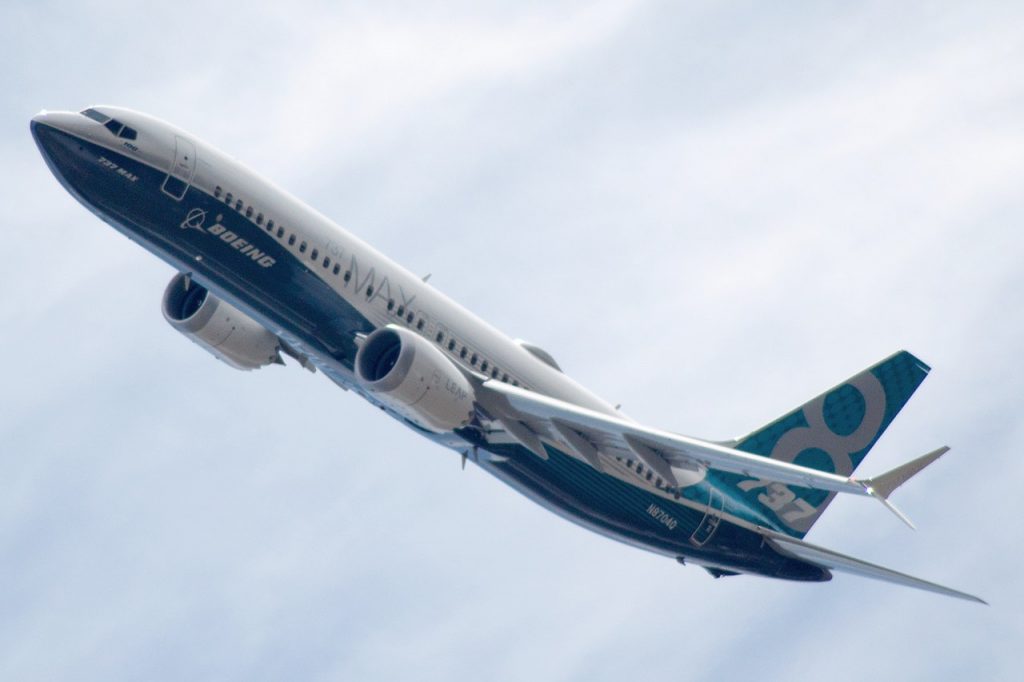
Boeing 737-8 MAX N8704Q at Farnborough Airshow 2016 (CC 2.0)
Over 35 lawsuits have been filed against Boeing since the Lion Air crash on October 29, 2018 in Indonesia, and now more are sure to come following the horrifying crash on March 10 of yet another Boeing 737 MAX 8 jetliner, this time in Ethiopia killing everyone on board. In addition to the families of passengers who lost their lives on those two flights suing, Boeing will also have to face lawsuits of “lost revenue” by airlines who use the 737 MAX 8 since the federal government recently grounded the aircraft.
Two Crashes, One Cause?
Investigators of the crash in Indonesia last year have zeroed in on a new anti-stall flight-control system as a factor in the crash; pilots said they were not trained in new features of the system that differ from previous models used on the popular 737 MAX, the newest version of the twin-engine Boeing 737.
Until the Trump Administration grounded the jetliner after the second horrifying crash, there were 200 of the planes in the air worldwide. Southwest Airlines, American Airlines, or any other airline that operates the jetliner could sue over loss of revenue during the grounding of the fleet. Lawsuits could potentially cost Boeing billions of dollars.
Pete Flowers, a lawyer with Meyers & Flowers in Chicago, the firm representing a family who filed suit following the Lion Air crash in October said he think the mounting evidence will prove that Boeing “failed to manufacture a safe aircraft.” Flowers said in a press conference last week, “The company’s ongoing negligence resulted in the deaths of passengers and crew of the Lion Air flight, and possibly now the Ethiopian Airlines flight as well. It is no wonder so many countries are grounding Boeing’s 737 Max 8.”
In a lawsuit was filed March 7 by the Seattle-based Herrmann Law Group and alleges that a “faulty sensor reading caused the automated system to kick in and force the nose of the jetliner down moments after the doomed flight took off.” Pilots attempted to bring the nose of the plane back up, but the plane went into a steep dive just 12 minutes into the flight and crashed in to the Java Sea at a speed of about 500 mph; everyone on board perished.
The families of 17 of those who died claim that Boeing did not include any mention of the new system in the Aircraft Flight Manual; the manual is what pilots rely to know what to do in every situation. The lawsuit also claims that the system activates automatically with no notice given to the pilot. Pilots have been critical of Boeing, stating the new automated system was installed without their knowledge and without proper training.
Boeing’s Response
A Boeing spokesperson did not comment on the Lion Air lawsuit but sends “our heartfelt condolences and sympathies to the families and loved ones of those onboard Lion Air Flight 610.” Boeing Chairman and Chief Executive Officer, Dennis Muilenburg said the company is “confident” the jet is safe and that operating details were not withheld from the airlines and flight crews flying the plane. After the Lion Air catastrophe, the Federal Aviation Administration (FAA) issued an emergency directive to airlines using the 737 MAX to update cockpit manuals and to include instructions for pilots on how to adjust flight controls under certain situations.
Preliminary Report for Ethiopian Airlines Crash
There were eight Americans on Ethiopian Airlines Flight 302 that crashed just a few minutes after takeoff; families of those killed could bring lawsuits against Boeing very soon.
While it’s too early to know the reason for the Ethiopian Airlines crash on March 10, a preliminary report on the Lion Air 610 crash in October was released in November 2018 and suggested a faulty sensor reading may have triggered an automated flight control system that sent the plane into a series of 26 dives at under 5,000 feet. The software, known as the “maneuvering characteristics augmentation system” (MCAS) was designed to “thwart a stall by automatically correcting the pitch of the 737 Max to compensate for bigger, fuel-efficient engines that shifted the plane’s center of gravity forward.”
Boeing Stands by its Jet
Boeing President and CEO, Dennis Muilenburg, has had this to say in response to the claims that Boeing has manufactured an unsafe jetliner: “Safety is a core value at Boeing for as long as we have been building airplanes; and it always will be. There is no greater priority for our company and our industry. We are doing everything we can to understand the cause of the accidents in partnership with the investigators, deploy safety enhancements and help ensure this does not happen again.”